|
Books Should Be Free Loyal Books Free Public Domain Audiobooks & eBook Downloads |
|
|
Books Should Be Free Loyal Books Free Public Domain Audiobooks & eBook Downloads |
|
Humorous Books |
|---|
|
Book type:
Sort by:
View by:
|
By: Ellis Parker Butler (1869-1937) | |
|---|---|
 Cheerful Smugglers
Cheerful Smugglers
Saving for the baby's education: how can a young family be disciplined so as to regularly put money in the pig (bank)? Why, put a tariff on all items coming into the house, just like the U.S. Government does/did for items coming into the country! But the devil is in the details; what about taxing items brought in by visitors? Is the housemaid herself a taxable item? What items really are 'necessaries' versus luxuries? When visitors arrive these guests stoop to either 'smuggling' in their luggage items to avoid having to pay up to 30% of the value, or wear only what they came dressed in... | |
 Goat-Feathers
Goat-Feathers
| |
 That Pup
That Pup
A puppy, unanounced and unordered, arrives in a crate at Mr. Murchison's house. Humorous events follow. | |
 Adventures of a Suburbanite
Adventures of a Suburbanite
Why is the neighbor so obsessed with his car? Where can we find a good gardener? Should we have a Santa Claus at our Christmas party? Yes, this is suburbia... much the same today as it was in 1911. | |
 In Pawn
In Pawn
Inspired by "Lives of the Saints", fat, lazy, good-for-nothing Harvey Redding decides to give up the junk-collecting business, and become a Saint. Meanwhile, deeply in debt to his sister, he has left his son Lem with her until he is able to pay her back. | |
 Swatty: A Story of Real Boys
Swatty: A Story of Real Boys
The fun adventures of Georgie, Swatty, and Bony, as they encounter flooding rivers, emotional girls, burning buildings, rotten stumps, mean teachers, a haunted house, dark caves, murderers, and ice jams. | |
 Perkins of Portland
Perkins of Portland
Amusing tales showing the effectiveness of advertising some rather questionable products. Perkins and the narrator partner in promotions directed at a gullible and willing public. Unlike most tales of the kind, with moralistic endings where the 'sharps' come to grief, Perkins and Co. become wealthy and quite pleased with themselves. | |
 Ellis Parker Butler Short Story Collection, Vol 1
Ellis Parker Butler Short Story Collection, Vol 1
Ellis Parker Butler was an American author. He was the author of more than 30 books and more than 2,000 stories and essays. These are eight of his humorous short stories about life. | |
By: Emily Eden (1797-1869) | |
|---|---|
 Semi-Attached Couple
Semi-Attached Couple
Young and beautiful Helen Eskdale and fabulously wealthy Lord Teviot seem to be the perfect match. But when they marry, they find that misunderstandings and jealousies continually drive them apart. The machinations and intrigues of a large supporting cast surround the central question of whether their marriage will survive. Emily Eden's comedy of manners is reminiscient of Jane Austen's witty and ironic novels. | |
By: Eugene Field (1850-1895) | |
|---|---|
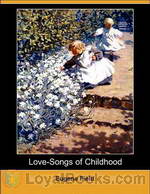 Love-Songs of Childhood
Love-Songs of Childhood
If you've heard and loved that delightful nursery rhyme/lullaby, Wynken Blynken and Nod you'd certainly enjoy browsing through its creator Eugene Field's Love Songs of Childhood. The volume contains some forty or more poems for children, which are ideal for read aloud sessions with young folks. Parents will certainly enjoy reading them too. Most of these poems have been set to music and are ideal for family sing-alongs too. Eugene Field was a gifted humorist as well as being a talented children's writer... | |
 The House An Episode in the Lives of Reuben Baker, Astronomer, and of His Wife, Alice
The House An Episode in the Lives of Reuben Baker, Astronomer, and of His Wife, Alice
| |
By: F. Anstey (1856-1934) | |
|---|---|
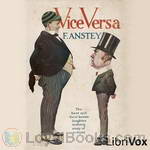 Vice Versa
Vice Versa
Set in Victorian times, the novel concerns business man Paul Bultitude and his son Dick. Dick is about to leave home for a boarding school which is ruled by the cane wielding headmaster Dr. Grimstone. Bultitude, seeing his son's fear of going to the school, foolishly says that schooldays are the best years of a boy's life, and how he wished that he was the one so doing. At this point, thanks to a handy magic stone brought by an uncle from India which grants the possessor one wish, they are now on even terms... | |
 Baboo Jabberjee, B.A.
Baboo Jabberjee, B.A.
Another delightful example of an English writer poking fun at his countrymen, or maybe all races' reactions to someone from a diferent background. A series of adventures of a well educated foreigner in London which originally appeared weekly in Punch, sometimes with illustrations, dealing with the difficulties of fully understanding a different culture. The hero's perfect English reminds one of a quote from "My Fair Lady" ..."His English is too good, he said, "that clearly indicates that he is Foreign. Whereas other people are instructed in their native language English people aren't." | |
 Talking Horse And Other Stories
Talking Horse And Other Stories
A collection of short stories by famed humorist and Punch magazine staff member, F. Anstey, pseudonym for Thomas Anstey Guthrie. They range from humorous and whimsical to haunting and thought-provoking. | |
 Tinted Venus
Tinted Venus
When a young newly engaged man finds himself bound for an amusement garden with an old flame, not his fiancee, it is not surprising that he still feels some attraction for her. When they escape the heat of the dance floor to walk among the trees in the garden, it is not surprising that they should come upon a statue of a woman of uncommon beauty, with the smallest hands. When the young man attempts to demonstrate that his absent fiancee has hands even smaller than this immortalized stone woman, it is surprising when the engagement ring he is carrying fits easily on the stone finger, but does not easily come off... | |
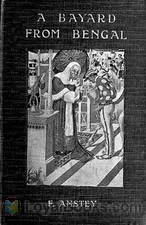 Bayard from Bengal
Bayard from Bengal
The estimable gentleman, Chunder Bindabun Bhosh, ESQ., B.A., travels from his native India to England, with his impeccable English and manners, which immediately mark him as a foreigner, and embarks on an enviable program of escapades. These stories are the product of the fertile imagination of Hurry Bungsho Jabberjee, B.A., a nom de plume for the humorist F. Anstey, which is a further nom de plume for Thomas Anstey Guthrie. Whether rescuing a nubile maiden from a charging bull or falling in love with said nubile maiden, Mr. Bosh, B. A. cannot help but perform with the requisite humor to engage our attention. | |
 In Brief Authority
In Brief Authority
Satiric comedy from 1915 about a nouveau riche British family and their nanny who get whisked off to Maerchenland ('the land of Fairy Tales') one evening in a car drawn by storks. The matron of the family, a thorough snob, is crowned Queen of the country by mistake. She is quick to accept her new position and is determined to introduce British social niceties in her realm. And this really is the land of Fairy Tales, with gnomes, giants, a dragon, magic, a fairy godmother and more. Trouble quickly starts to brew as the royal couple and their son introduce things like capitalism and golf... | |
 Voces Populi
Voces Populi
F. Anstey was the nom de plume of Thomas Anstey Guthrie, a Londoner who was trained for the bar but found success as a writer of humorous pieces for Punch and humorous novels. Voces Populi, a collection of his Punch pieces, is considered to be among his best works. He treats an array of situations from the charlatan conjuror to a row over a lady's large, obstructive hat at the music hall. | |
 Mr. Punch's Model Music-hall Songs & Dramas
Mr. Punch's Model Music-hall Songs & Dramas
F. Anstey was the nom de plume of Thomas Anstey Guthrie, a Londoner who was trained for the bar but found success as a writer of humorous pieces for Punch and humorous novels. Mr. Punch's Model Music Hall is a collection of humorous pieces written for Punch, divided into songs and dramas. In his usual fashion, Mr. Anstey captured the tone of his times and then exaggerated whatever was already absurd to entertain and give pointed commentary at the same time. | |
By: F. C. (Francis Cowley) Burnand (1836-1917) | |
|---|---|
 Happy-Thought Hall
Happy-Thought Hall
| |
By: F. Scott Fitzgerald | |
|---|---|
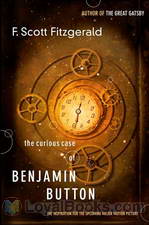 The Curious Case of Benjamin Button
The Curious Case of Benjamin Button
A life lived backwards, with events happening in reverse order forms the strange and unexpected framework of one of F Scott Fitzgerald's rare short stories. The Curious Case of Benjamin Button was published in Collier's in 1927 and the idea came to Fitzgerald apparently from a quote of Mark Twain's in which he regretted that the best part of life came at the beginning and the worst at the end. Fitzgerald's concept of using this notion and turning the normal sequence of life on its head resulted in this delightful, thought provoking fantasy tale... | |
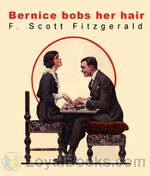 Bernice Bobs Her Hair
Bernice Bobs Her Hair
Pretty but socially clueless Bernice lets her know-it-all cousin push her around, but eventually, something's gotta give! (Introduction by BellonaTimes) | |
By: Finley Peter Dunne (1867-1936) | |
|---|---|
 Mr. Dooley: In the Hearts of His Countrymen
Mr. Dooley: In the Hearts of His Countrymen
| |
 Mr. Dooley's Philosophy
Mr. Dooley's Philosophy
| |
 Mr. Dooley Says
Mr. Dooley Says
| |
By: Forrest Crissey (1864-1943) | |
|---|---|
 Tattlings of a Retired Politician
Tattlings of a Retired Politician
"The letters of Hon. William Bradley, Ex-Governor and former veteran of practical politics, written to his friend and protege Ned who is still busy 'carving a career back in the old state.'" This is a novel filled with humorous political anecdotes by the main character, the Honorable William Bradley, told for the benefit of his protege, Ned. It conveys a sense of the ironic and humorous side of politics in Washington and back in their home state. | |
By: Francis Marion Wing (1873-1956) | |
|---|---|
 "The Fotygraft Album" Shown to the New Neighbor by Rebecca Sparks Peters Aged Eleven
"The Fotygraft Album" Shown to the New Neighbor by Rebecca Sparks Peters Aged Eleven
| |
By: François Rabelais (1494-1553) | |
|---|---|
 Gargantua and Pantagruel, Book III
Gargantua and Pantagruel, Book III
The five-volume work chronicling the adventures of father Gargantua and son Pantagruel is a vehicle for Rabelais' satire of sixteenth-century European society. It is lively, outrageous, and, at times, bawdy. This the third of the five volumes--all are translated by Thomas Urquhart and Peter Motteux | |
By: Frank Gelett Burgess (1886-1951) | |
|---|---|
 Romance Of The Commonplace
Romance Of The Commonplace
Thirty four whimsical, tongue-in-cheek, and entertaining essays about not much in particular, published in 1902, by one of the most popular writers of the late nineteenth and early twentieth centuries. The American Gelett Burgess was an artist, art critic, poet, author, and humorist. Nonsense verse was a specialty. - Summary by David Wales | |
 Maxims of Methuselah
Maxims of Methuselah
Being the Advice given by the Patriarch in his Nine Hundred Sixty and Ninth Year to his Great Grandson at Shem's Coming of Age, in Regard to Women.The following is, so far as I know, the only authentic rendering into the English language of the three hundred and thirty parables attributed to Methuselah. . . . Of its origin, the book, although freely rendered into the idiom of the hour, still bears intrinsic evidence of having been compiled by one who had had extraordinary experience with women. The amorous expert will not find it hard to believe that 969 years would be none too short a time for any one man to have accumulated such a profound lore... | |
By: Frank Thomas Bullen (1857-1915) | |
|---|---|
 Confessions of a Tradesman
Confessions of a Tradesman
Frank T. Bullen is best known for his books based on his adventures at sea. However, he had a life on shore as well. He first went to sea as a boy as a cabin boy. He there had many adventures as a hand on a whaling ship. He then came ashore and tried his hand at being a "Tradesman". This is that story and also tells how he became the well-known author he is now. It is a very interesting, enjoyable and entertaining depiction of the trials and tribulations he had in his life in 19th century London as a tradesman. - Summary by Wayne Cooke | |
By: Frederic Stewart Isham (1866-1922) | |
|---|---|
 Nothing But the Truth
Nothing But the Truth
A young man, finding himself unexpectedly impecunious, attempts to improve his fortunes by wagering that he can speak nothing but the absolute truth for three weeks. He soon learns, however, that telling only the unvarnished truth can have surprising consequences. This 1914 novel of love, mystery, and misunderstandings, with amusing characters and plot twists, was adapted as a Broadway play in 1916, followed by six motion pictures: in 1920 and 1929; in 1931 separately in Spanish, French and German; and in 1941 starring Bob Hope and Paulette Goddard. Frederic S. Isham was a writer of short stories, novels and plays. (Lee Smalley) | |